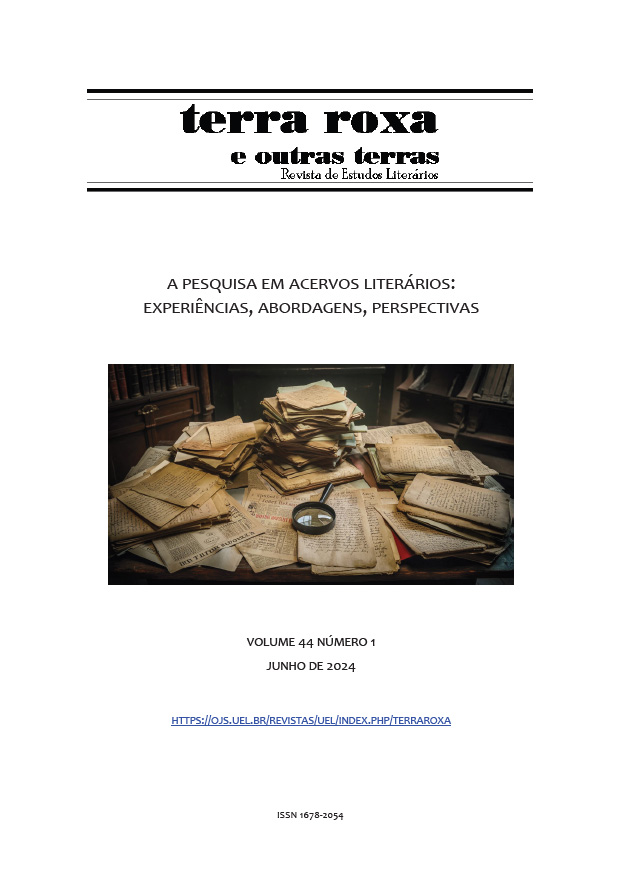Letters at the end of Camilo Mortágua
DOI:
https://doi.org/10.5433/1678-2054.2024vol44n1p125Keywords:
Josué Guimarães, Correspondence, Alternate endingAbstract
The proposed study is centered on the correspondence of Josué Guimarães, renowned for his novel Camilo Mortágua (1980), as well as an alternative ending to this work, which remains unpublished. This alternative outcome is believed to have been prompted by letters received from readers regarding the published novel. Camilo Mortágua garnered widespread acclaim, hailed by some critics as one of the most significant novels in Brazilian literature for its exploration of historical events spanning the early 20th century to the civil-military coup of 1964. The novel deeply resonated with readers, prompting some to correspond with the author regarding the fate of the protagonist. These reader letters serve as the focal point for the present study, providing a lens through which to examine the interplay between correspondence, reception, and engagement with archival material. Drawing upon theoretical frameworks proposed by Biasi (2010) and Willemart (2014) in the context of genetic criticism, the study will also engage with theories related to correspondence as articulated by Diaz (2016). By synthesizing these theoretical perspectives, the study aims to elucidate the dynamic relationship between authorship, reader response, and the archival record within the context of Guimarães's oeuvre.
Downloads
References
BIASI, Pierre-Marc. A genética dos textos. Porto Alegre: EdiPUCRS, 2010.
BORDINI, Maria da Glória. Matérias da memória. Porto Alegre: Editora da UFRGS, 2020.
BOUZINAC, Geneviève Haroche. Escritas epistolares. Trad. Ligia Fonseca Ferreira. São Paulo: Editora da USP, 2016.
DERRIDA, Jacques. O mal do arquivo: uma impressão freudiana. Rio de Janeiro: Relume Dumará, 2001.
DIAZ, Brigitte. O gênero epistolar ou o pensamento nômade: formas e funções da correspondência em alguns percursos de escritores no século XIX. Trad. Brigitte Hervot & Sandra Ferreira. São Paulo: Editora da USP, 2016.
FOUCAULT, Michel. Outros espaços. Estética: Literatura e Pintura, Música e Cinema. São Paulo: Forense Universitária, 2001. 411-422.
GONZAGA, Sergius. A vitória do realismo. Josué Guimarães: escrever é um ato de amor. Porto Alegre: IEL, 2006. 34-41.
GUIMARÃES, Josué. Camilo Mortágua. Porto Alegre: L&PM, 1982.
MARQUES, Reinaldo. Arquivos literários: teorias, histórias, desafios. Belo Horizonte: Editora UFMG, 2015.
MIRANDA, Wander Mello. Archivos e memória cultural. Eneida Maria de Souza & Wander Mello Miranda, orgs. Arquivos Literários. Belo Horizonte: Editora UFMG, 2003. 35-42.
SANTIN, Bruna. Prezada palavra: literatura e correspondência em Josué Guimarães. Dissertação (Mestrado em Letras), Instituto de Filosofia e Ciências Humanas, Universidade de Passo Fundo, Passo Fundo, 2023. Disponível em: http://tede.upf.br/jspui/bitstream/tede/2493/2/2023BrunaSantin.pdf.
WILLEMART, Philippe. Psicanálise e teoria literária: o tempo lógico e as rodas da escritura e da leitura. São Paulo: Perspectiva, 2014.
Downloads
Published
How to Cite
Issue
Section
License
Copyright (c) 2024 Miguel Rettenmaier, Bruna Santin

This work is licensed under a Creative Commons Attribution 4.0 International License.
Authors who publish in this journal agree to the following terms:
a) The authors retain the copyright and grant the journal the right of first publication, the work being simultaneously licensed under the Creative Commons Attribution-NonCommercial 4.0 International License, allowing the sharing of the work with acknowledgment of the authorship of the work and initial publication in this journal.
b) Authors are authorized to assume additional contracts separately, for non-exclusive distribution of the version of the work published in this journal (eg, publish in an institutional repository or as a book chapter), with acknowledgment of authorship and initial publication in this journal.
c) Authors are allowed and encouraged to publish and distribute their work online (e.g. in institutional repositories or on their personal page) after the editorial process, as this can generate productive changes as well as increase impact and citation of the published work (See The Effect of Open Access).
d) The authors of the approved works authorize the journal to, after publication, transfer their content for reproduction in content indexers, virtual libraries and the like.
e) The authors assume that the texts submitted for publication are of their original creation, taking full responsibility for their content in case of any objection by third parties.



















